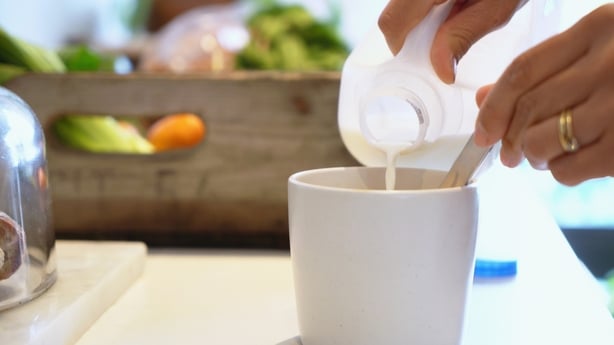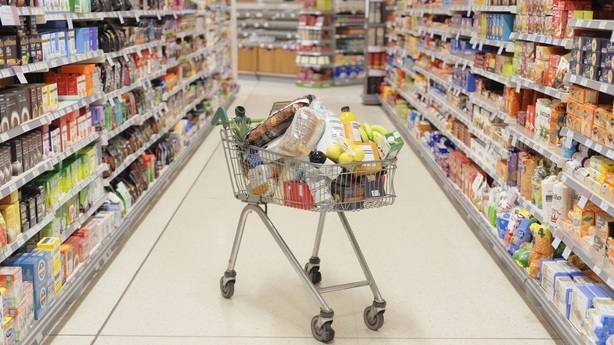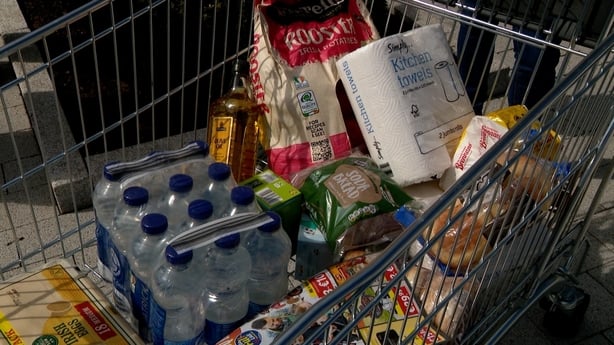As supermarkets slash butter and milk prices, Morning Ireland reporter Cian McCormack looks back through old shopping receipts and discovers the price reductions are not as good as they seem.
Comparing shopping receipts from 2021 and today, there is one glaring fact. Recent food price cuts by supermarkets are not as good as they seem.
Supermarkets slashed the prices of milk and butter over the past week, and the figures look dramatic.
Two litres of own-brand supermarket milk dropped to €2.19 from €2.29, whilst the price of own-brand butter was marked down to €2.99 from €3.39 – a 11.7% decrease.
The headline figures are striking, but price cuts fall far behind the level of increase in food prices over the past two years – a long way off.
First, take butter for example, this week we have seen a reduction from €3.39 to €2.99. That 40c decrease falls far short of the €1.20 increase that butter consumers have endured since 2021.
This information comes from my personal receipts. One such receipt, from 3 May 2021, shows a 454g pack (one pound) of butter cost €2.19 then.
This means that even with the price slash to €2.99 for one pound of own brand butter by Lidl, Aldi, Supervalu or Tesco – well, that butter is 36% more expensive than it was two years ago.
Even more jaw dropping is the increase in the price of milk as paid by consumers since May 2021.

Again, digging through old receipts shows that on 3 May 2021, two litres of own brand milk cost €1.49 in the supermarket I did my family shopping in. Today, after the milk price cuts that same product is €2.19 – it dropped 10c this week.
This means milk increased 80c per two litres in two years but has only decreased by 10c. That is a whopping increase not matched by the decrease.
This week's cut in milk prices means what I bought in 2021 is 47% more expensive today – even after the price cut.
Despite this, St Vincent de Paul (SVP) said the price cuts were welcome.
There is a recognition among many groups – including Social Justice Ireland - that food prices are unlikely to return to the lower level they were at in 2021.
But while SVP welcomed the cuts, it added a caveat and cautioned against getting too caught up in the supermarket price slashing frenzy.
The charity told RTÉ's Morning Ireland that its figures showed that food poverty remains high.
Around 7,000 people contacted it in April because they could not pay for their weekly shopping to put food on the table.
When figures are further detailed, the number of calls for help to the charity because of the negative impact of the cost of living crisis was 14,000.
Overall, when the first quarter of this year is compared to last year, its calls were up 19%.
Approximately 45,000 calls were received, the highest number during the first quarter in any year during the past decade.

So while on the face of it, dropping food prices make eye-catching headlines, the slashing of supermarket milk and butter prices will not help address the overall impact of food inflation on families who cannot afford food.
"Any price reduction is to be welcomed. You know any cut in the cost of essentials for people on low incomes is good news. But the reality is, with food inflation running at more than 16% and food making up a much greater proportion of a family budget for low-income households, it's having a disproportionate impact," said Dr Tricia Kielthy, Head of Social Justice and Policy at SVP.
"We would caution that while these cuts are welcome, it's not going to fully address the issue of food inflation. We must still be concerned about its impact, particularly on households who are already experiencing food poverty.
"To put it into context, last month, in April, we received 14,000 calls for help and half of those were from people who could not afford the food shopping.
"In the first quarter of this year our calls for help are up 19% compared to quarter one of 2022. We're still seeing, month-on-month, an increasing number of people needing our support."
She added there were many different people and families struggling to make ends meet, including "people who were struggling on a low income prior to this cost of living crisis and really are not being able to get by from week to week" and people who have never sought help before.
"We have people who maybe never had to seek our help before and are now in trouble and need help with either an energy bill or the basics like food as well," Dr Kielthy said.
She added this is "because their food shopping is so expensive, or they've had a massive energy bill come through the door in January and February, and they've tried to pay that back".
"We're seeing food poverty still rising, food inflation having a massive impact on households, and we're also seeing that not being felt equally across the board.
"We get a lot of calls from households in rural areas who don't have access to a larger supermarket and they end up paying more. They may not be able to access the value lines or get those price cuts. We really need to think about a whole range of different households and how it impacts them in different ways as well," said Dr Kielthy.

Social Justice Ireland said people have less spending power than before and it does not expect food prices to fall back to the levels they were at two years ago.
"Anybody on a lower fixed income, most of their money is spent on the basics. It's spent on food. It's spent on fuel. It's spent on energy. They were the real key areas of inflation over the last two to three years," said Research and Policy Analyst with Social Justice Ireland, Suzanne Rogers
"When you look at your actual spending power, what we're seeing is the money we have isn't going as far as it used to. These prices are due to drop, but they're not going back to what we had seen before," she said.
A recent report by consultancy firm Kantar showed a drop in food price inflation from 16.8% to 16.6% during the 12 weeks to 16 April.
Senior retailer lecturer at TU Dublin, Damien O’Reilly, said inflation will continue at a lower rate.
"I don't think we're going to see a slide in the cost, but I think we're going to see is a stabilisation in the rate of inflation.
"We’re not going to see prices deflate. I'd reckon that we'd see maybe a 5% increase in prices over the coming six months. And then after that, maybe down to 2% to 3% for the next couple of years. But we're definitely not seeing price deflation," said Mr O’Reilly.
Morning Ireland contacted Tesco, Aldi, Lidl and SuperValu, but none made a spokesperson available.
Retail Ireland, which represents supermarkets and other retailers, said inflation would remain high.
"We are still looking at commodity prices at around 40% higher than they were before the war in Ukraine broke out. And what we also saw last year was a lot of retailers holding off passing on some of those increases to consumers," Retail Ireland director Arnold Dillon said.
"There is a time lag, certainly in terms of how some of these price effects manifest themselves in food inflation. We think that inflation is going to continue to be high, over the coming period, but we do expect the pressure to ease over the coming months. Hopefully that will translate into a better environment for consumers."






